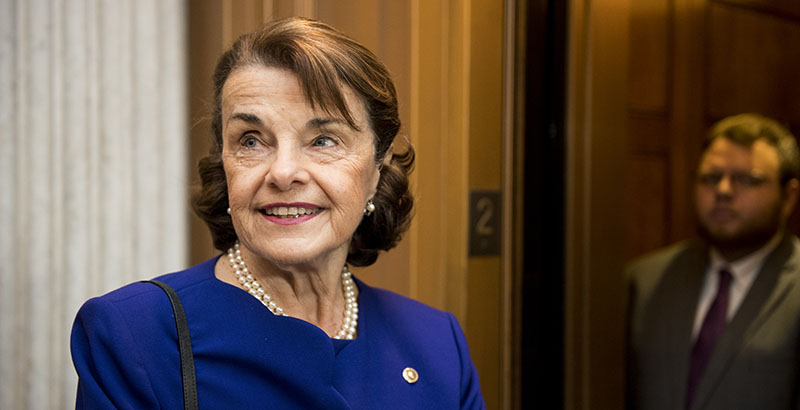Pondiscio: Video of Students Confronting Sen. Dianne Feinstein on Green New Deal Offers a Sad Lesson in Using Kids as Political Props

I’m starting to sour on “authentic engagement” of kids in civic education, a concept I’ve long supported, and occasionally supervised and even led as a teacher. Preparing young people for active and engaged citizenship is an essential and neglected purpose of public education. How best to cultivate these qualities in school, however, is far from settled. In some circles, it takes the form of encouraging children to be directly involved in activism and advocacy, ostensibly student-led. But that’s morphing from a valuable instructional strategy into a manipulative and cynical use of children as political props in the service of causes they understand superficially, if at all.
The most recent bridge-too-far moment was the viral video of student “activists,” some of them quite young, from the youth climate change group Sunrise Movement going toe-to-toe with Sen. Dianne Feinstein over the Green New Deal. The main response to that confrontation largely painted the California senator as the heavy in a testy exchange in which she offers an ad hoc civics lesson about how meaningful legislation is drafted and passed, something the kids arguably should have learned before showing up at a senator’s office with cell phone cameras recording the student activist theater piece.
“Some scientists have said that we have 12 years to turn this around,” one child says on the video. “Well, it’s not going to get turned around in 10 years,” Feinstein calmly responds, explaining that the Green New Deal has no chance of passage in the Republican-held Senate and telling the kids, “You can take that back to whoever sent you here.” She tries to discuss her own version of the legislation, but the kids aren’t impressed or seemingly even listening. They are there to pronounce and perform, not to engage. “I’ve been doing this for 30 years. I know what I’m doing,” Feinstein tells the kids bluntly, but not unreasonably. “You come in here and you say, ‘It has to be my way or the highway.’ I don’t respond to that.”
The awkward exchange had the odd effect of making Feinstein temporarily a hero of the right. “It’s the most wildly transgressive thing you’ve ever seen. Children are our future! They must be coddled and exalted, their ideas about politics and the environment received as though they are the unpublished thoughts of Bertrand Russell,” wrote Caitlin Flanagan in The Atlantic. “Seeing their rudeness treated in the measured and unyielding way that adults use to speak to misbehaving children is weirdly thrilling. She never lifted her voice, but compared with the way politicians usually respond to children, she came across like W.C. Fields.”
For me, it was not “weirdly thrilling” but deeply embarrassing, even upsetting, that adults allowed kids, the oldest of whom was 16 (the rest appeared to be much younger) to be so badly overmatched and unprepared. But what Flanagan nailed was the decidedly inauthentic role we have assigned to children in our public discourse. In refusing to play along, Feinstein revealed the hollow core of fashionable ideas about civic education and “action civics.” Bizarrely, it was Feinstein who was called to account for her condescension and dismissal in the aftermath. Her only sin was taking the students seriously. She responded as a reasonable adult to an act of “authentic” youth activism with the sophistication level of a pouty lip and a teardrop, a guilt-trip demand for a pony from grownups.
This sort of thing is fast becoming the norm. Last year, when a fawning media put the Parkland kids somewhere on the spectrum between gun control saviors and public policy savants, David Hogg, then emerging as the most visible and voluble member of the youthful group, opened a window into the childlike view of advocacy that Feinstein neglected to genuflect before, explaining to an interviewer that he was forced to become an activist because adults “don’t know how to use a f***ing democracy” and pronouncing himself “the [National Rifle Association’s] worst nightmare.”
“When your old-ass parent is like, ‘I don’t know how to send an iMessage,’ and you’re just like, ‘Give me the f***ing phone and let me handle it.’ Sadly, that’s what we have to do with our government; our parents don’t know how to use a f***ing democracy, so we have to,” he continued. Hogg’s tirade made me wince, not merely for its arrogance and vulgarity, but especially for its stunning naivete, as if our most challenging and contentious problems are something other than the clash of competing interests and values. Tens of thousands of gun deaths, all preventable were it not for adult bumbling and incompetence.
It is not condescending or dismissive to challenge kids’ youthful idealism; it is condescending not to educate them in how things actually get done and why they happen as they do. We can pretend that parading children before cameras and confronting lawmakers builds student “agency,” but agency is the ability to make things happen in the world, not just garner retweets, ink and airtime, or indulgent pats on the head. Feinstein tried to explain as much to the young Green New Deal supporters, noting, “There’s no way to pay for it, so nothing will happen.”
It’s hard to define when involving children in advocacy and activism crosses the line and loses its claim to educational value, but you know it when you see it. A video posted on Twitter last month showed striking Oakland, California, teachers chanting, “Students, students, what do you see?” Small children respond, “I see my teachers standing up for me.” No less out of bounds is the use of children as political props in the charter school sector, where kids routinely miss school to attend high-profile rallies and protests. A few years ago, I chaperoned one such charter school trip to Albany, New York, at one point accompanying a small group of elementary school kids and their parents to “lobby” a mercifully indulgent state senator — an awkward and unproductive meeting that made the Feinstein affair sound like Question Time in the British Parliament. Neither the kids nor the parents had the slightest inkling of why they were there other than to pose for a photo op. It would be dishonest to claim any caloric content whatsoever for the children.
None of this is meant to suggest that there’s never a role for school-age children to participate in public affairs and politics, and to do so authentically and effectively.
Last month, for example, President Donald Trump signed into law the Civil Rights Cold Case Records Act, a bill originally drafted by New Jersey civics students to require that decades-old government records from unsolved civil rights cases be declassified and released to the public. The onus is on educators to be clear on the difference between civic engagement and civics theater, and to draw a line between the two.
There are multiple angles to consider: Is it student-driven, or are kids being manipulated? Is it partisan? Is there room for different viewpoints? Are the students — even when self-motivated — informed and well prepared? Like any other activity, there ought to be a clear and compelling “why” that guides our thinking and planning. Our first responsibility is teaching, not activism. If the “why” is driven by political or activist impulses, not educational ones, we’re losing our way.
Writing in The New Yorker, Bill McKibben, an environmental activist and author, “imagines that Senator Dianne Feinstein would like a do-over of her colloquy” with the Sunrise Movement students. I hope not. It’s the adults who brought the children to her office, whether parents, teachers, or activists, who ought to wish for one — and in the future think twice before using children as puppets and props.
There was, however, one good, authentic civics education moment at the tail end of the uncut video of the scene in Feinstein’s office. As the kids leave, the older girl in the video, the one who was most adamant that only the “pricey and ambitious” Green New Deal is sufficient to address climate change, asks Feinstein for an internship in her office. “You got one,” she replies and steers the girl to an aide to make it happen right on the spot. At least one student will now have the opportunity to learn from Sen. Feinstein, who was the only real civics teacher in the room.
Robert Pondiscio is a senior fellow at the Thomas B. Fordham Institute. He writes and speaks extensively on education and education-reform issues, with an emphasis on literacy, curriculum, teaching, and urban education.
Get stories like these delivered straight to your inbox. Sign up for The 74 Newsletter

;)
